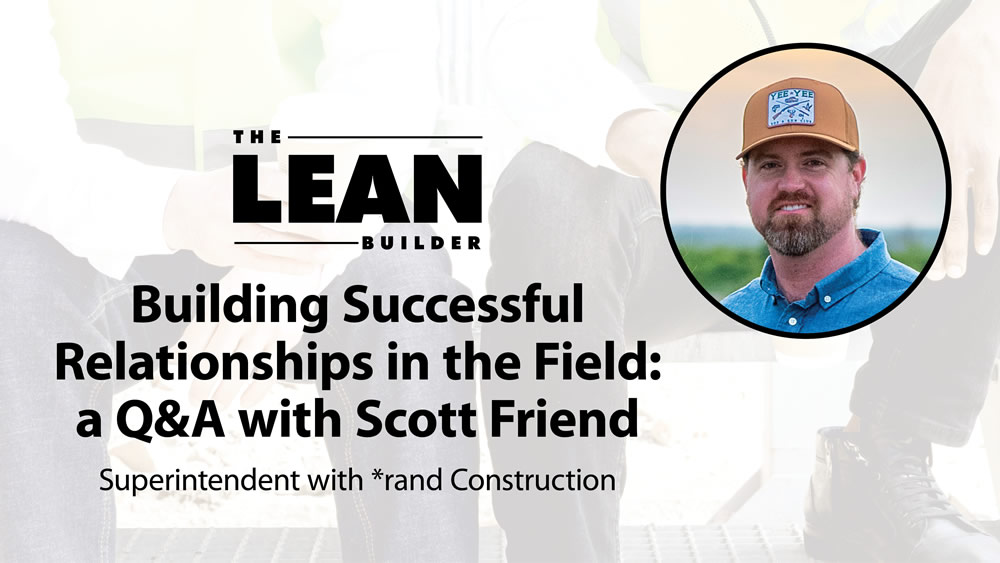Katherine Van Adzin, a construction technology expert, talks to Scott Friend, Superintendent with *rand Construction and host of The Construction Veteran podcast, about building successful relationships that will positively affect project outcomes.
Building Successful Relationships
Katherine Van Adzin: Your experience in construction spans a wide variety of roles, from project controls, project management, operations, and now to being a superintendent. Having worn all these hats in the past, are there things about each of these roles you wish the other roles understood about each other’s work?
Scott Friend: That’s a really loaded question. I guess I don’t know what I want to be when I grow up, so I keep jumping around. I think having those different experiences has really helped me out in every other role. The typical two main roles within our industry are either the project management side or the superintendent side. But having served on both, it’s really improved one or the other.
It’s really impactful for the team as a whole if the superintendent understands why these cost changes are such a big deal, or how to read the contracts, understand scope, and things like that. It’s also really helpful for a project manager to understand why is the superintendent calling me and not yelling at me necessarily but being very aggressive — “I need this product now!”?
It’s really important for the PM to understand the schedule and how we look at it. There are so many things, that’s why I say it’s loaded. But just understanding everything as a whole, and I think that takes some time. So I force myself to serve in those different roles because it’s very easy to complain about the other side if you will. Or, “Oh, gosh, the estimator didn’t pick this up.” Let’s go help the estimator understand why it’s so important. That could extend out to clients and subcontractors.
Serving on the subcontractor side previously, I liked knowing why my client expected me to have answers by a certain day; because her OAC was a certain day, so that’s why she needed them before. Just understanding that process, because we can get inside of our own head, “Well, they’re just mad at me, so I’m going to be mad at them.” But why are they aggressive? Why are they upset and stressed?
Van Adzin: In addition to being a superintendent, you also have your own podcast, The Construction Veteran, and you focus a lot on supporting and empowering veterans who work in construction. Are there things that contractors can do, from your point of view, to help veterans succeed?
Friend: Yes. Understanding that we’re really good in this high-stress environment that is our industry — I don’t want to sugarcoat it; it is a very high-stress industry with a lot of change. But we’re used to that. I think giving them an opportunity, giving them some runway to really flex, if you will, and show what they’re capable of in those environments. I’m not by any means saying that non-veterans don’t have that skill and grit, but it’s pretty typical with veterans.
I think we could do a good job of building a community within the company. I’ve been a chairman of an organization in a previous company that focused on supporting fellow veterans within the company. How do we attract veterans to the company? Why would I choose company A over company B?
We really like anonymity, I would say. I’ve talked about it on my own podcast, that I struggled a lot when I got out with the concept of being outside of my lane and how that’s not okay, because we really want to help. We’re really there for the team effort. Especially if you’re in a combat zone, your job might be X, but you’re going to do Y and Z because that’s going to save someone’s life.
Understanding that veterans typically will try to help the team, they’re not trying to take somebody’s job or step on any toes. More often than not, I would say they’re really just trying to help us all succeed as a team.
Van Adzin: You describe yourself as a relationship builder. Can you tell me more about that, and why that’s so important to you in your work in construction?
Friend: This goes back to a company I worked at when I first got off of active duty. I can remember us having this large field meeting. At the time, the president of the company said something to the effect of, “We’re one of the last businesses or industries that’s built on relationships.” I didn’t have any idea what he meant at the time, but I’ve come to find that to be very true.
I hate to say it, but a lot of the jobs are very similar. Drywall’s drywall, paint’s paint. Not a lot changes from job to job, but those relationships are what maintain us through each job. When I’m stressed out, I know I can count on some of my trades or maybe my assistant superintendent. My focus really, at least in my role now, is building the relationships and training them how to work amongst each other.
The relationship among the trades, to me, is probably one of the most important relationships in the field. I get a lot of joy when I get to see these guys working together in this room that I’m in and before I even walk in. I get a lot of joy out of seeing them already collaborating and coming up with plans. That couldn’t happen if we had the old-school mentality of, “Hey, I’ve got this tunnel vision. I’m focused on my trade. Nobody else matters. Forget everybody else.”
I think you might agree that that’s not how we operate anymore. That’s just not the industry. Relationships have to be the central focus, whether that’s your team — my wife and children, that’s my most important relationship. I don’t want to go home stressed out and upset and inadvertently take that out on them.
But also, very practically, relationships can impact pricing. We’ve all had that experience where an estimator might call a trade and they say, “Well, who’s the PM on the job?” Or, “Who’s the super on the job?” Maybe it’s somebody they did not have a good relationship with, and they just doubled their price and priced themselves out of it on purpose.
Things like that are flexible, and I’ve seen it personally. There are jokes about, “We’ll have the John Smith tax on this job because we know he’s going to lose us a bunch of money.” I think that really does happen. It just goes back to treating people how they want to be treated. I don’t want to yell at anybody, I don’t want anybody to yell at me. At the end of the day, it’s really the relationship that’s built, that continues the industry, continues the job, makes us look good, get future work, and feed our families.









